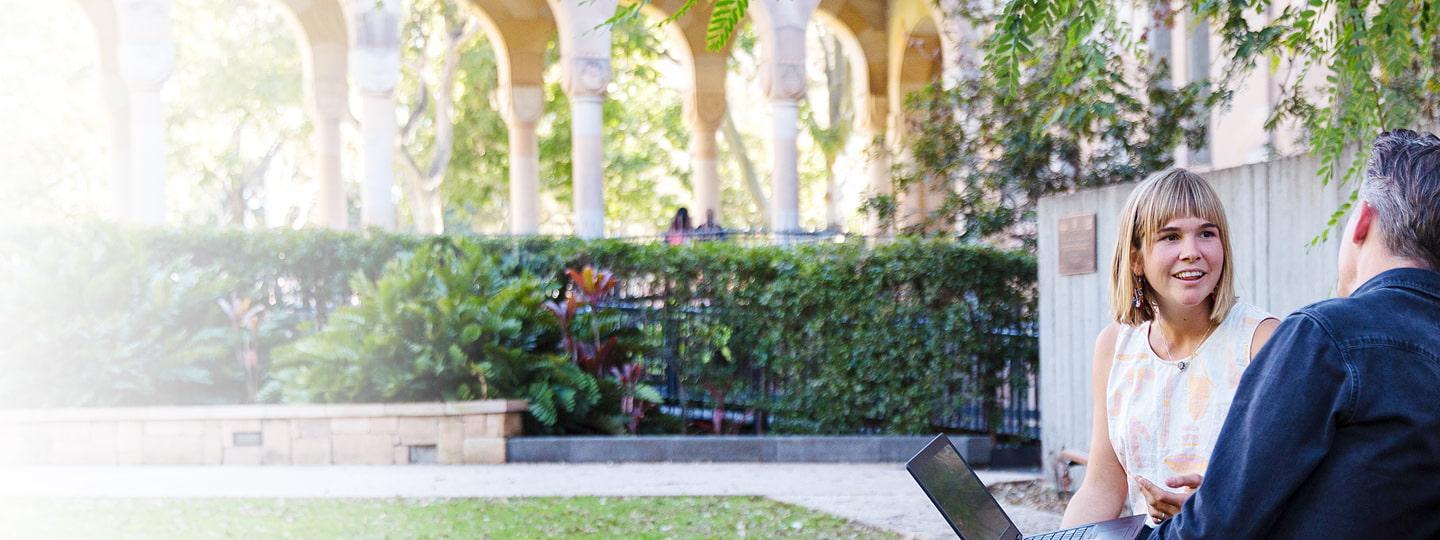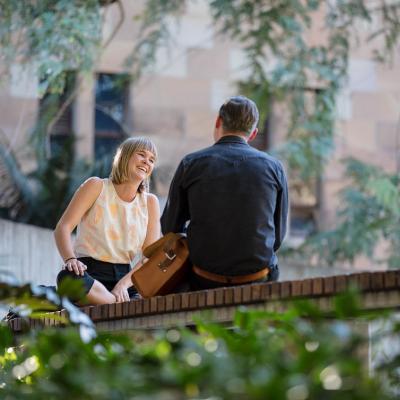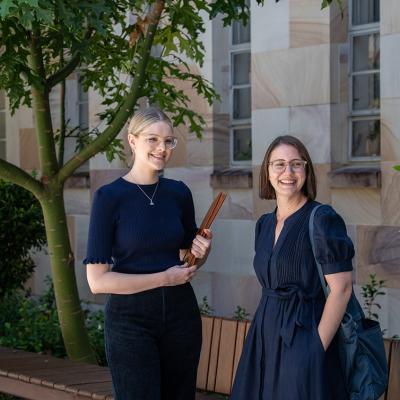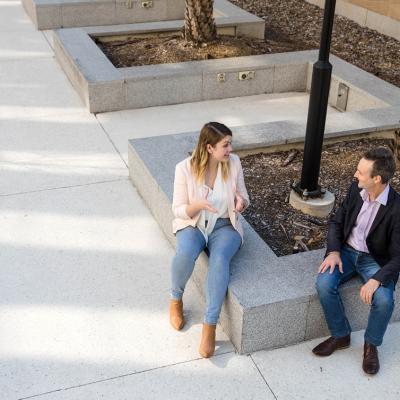Ever wondered what it's like to do a PhD in biological sciences at UQ? Choosing the right pathway can be hard, especially when there are so many unknowns out there.
What can you do with a PhD in biology? Can you tailor your PhD topic? How is doing a PhD in biological sciences different to an undergraduate degree in biology?
PhD candidate Gabrielle and her supervisor Dr John Dwyer have teamed up to answer some of your questions to help you decide what’s right for you.
What's your favourite thing about being a biology PhD supervisor?
John: There are many. I think working with really bright, enthusiastic people. That's an absolute joy. It sort of keeps me enthusiastic – it rubs off. I also really enjoy the collaborative process of working with PhD students to try and address questions. Whether we're trying to understand the natural world or trying to solve an ecological problem, doing that is part of a supervisor PhD collaboration and it's super rewarding.
Get tips from PhD students on how to find the right PhD supervisor for you.
Why did you choose to do a PhD in biological sciences?
Gabrielle: I think if you had asked me when I was in undergrad, or had told me that I would be doing a PhD, I would have been fairly surprised. But during my undergrad, I realised I really liked research and then went on to honours and realised I loved research even more – particularly ecological research and all of the things that went with that, from the fieldwork to the analysis to the writing.
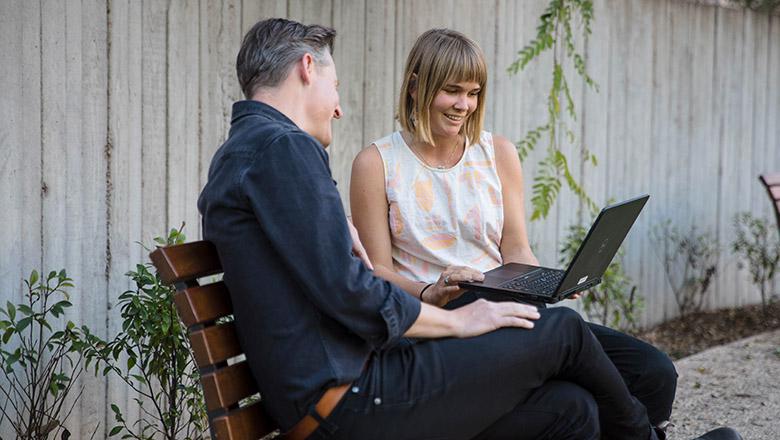
Gabrielle discusses the next steps of her PhD in biology with her supervisor, Dr John Dwyer.
Why are you passionate about research?
John: It's a blessing and a curse being into plants. Everywhere we look, when we go for a walk, even in a city – but it's better when you're in the bush – there's a question to be answered. Why is that tree growing there? Why is that grass growing there? And so, that sort of endless curiosity, or an endless source of questions, makes me both incredibly passionate about doing ecological research and it makes me maybe the worst person to go on a bushwalk with – I’m very slow.
I just love the problem solving of trying to say, why does that grow there? And there's so many different things interacting to have resulted in that and just trying to peel back each of those layers using the scientific method, and collaborating with bright young people is just endlessly joyful and fascinating.
Why did you choose to do your PhD in biology at UQ?
Gabrielle: I've done my whole tertiary education at UQ. So, I've had a long time to make lots of connections with people in the community of UQ. When I was thinking about starting my PhD in biological sciences, there was no real reason for me to look further afield, because I had this great connection with my honours supervisor Rod, and I knew that was the research field that I wanted to go into – I was really passionate about learning about plants in the arid zone. Rod is one of the key people in Australia who does that kind of research.
During my honours year, I started to make these connections with the UQ community, in particular the School of the Environment people, and I didn't really want to leave.
"I was excited to keep hanging out and being part of this community – a funny, eclectic bunch of humans."
Who do you think should do a PhD in biology?
John: Anyone with enough curiosity and enthusiasm for a topic that they can devote 3 or 4 good years of their life to pursuing. That's the key: enthusiasm and curiosity. You might be driven to solve a big problem, but that's part of it – that's the reason why you're curious and enthusiastic.
I'd also say to people thinking about doing a PhD – ask yourself why you want to do it. It's a lot to go through. It's very positive, well for me it was a very, very positive process and journey, but it's a long journey. It's a few years and you really want to have not just one clear goal or endpoint, but know what your options are, and do your PhD because that's where you want to get to.
I have spoken to people in the past who are kind of on autopilot and it's the next thing to do, and I don't think that's a good reason to do a PhD.
"So be curious, enthusiastic and think about why you're doing it."
Find out what makes a good PhD student.
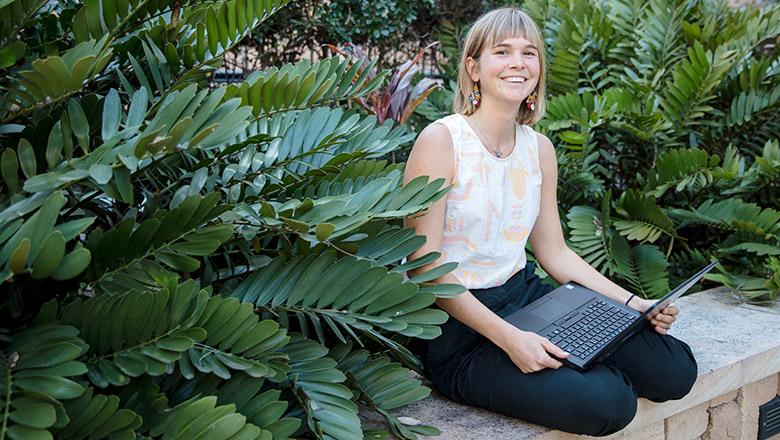
Enthusiasm and curiosity aren't a problem for Gabrielle, whose PhD in biological sciences is an extension of her passion for plants.
What scholarship have you been awarded and how did you find out about it?
Gabrielle: I got the UQ Graduate School scholarship. I found out about it from my primary supervisor, and he just said to go and look on the internet as "there's this whiz bang scholarship that you can get". If you've done well in your honours, you can apply for it, so I went on and it was a very easy application process. It literally took me 5 minutes.
How to get a PhD in biology at UQ
Wondering how, exactly, you go about getting a PhD in biology at UQ, including how to fund your studies? Read our complete guide on how to get a PhD.
How does supervising biology PhD candidates bring you closer to our aim of advancing ecological knowledge and informing better management of ecosystems and landscapes?
John: I try and design PhD projects to fit within that broad theme. Sometimes I'll have students like Gabrielle, looking at invasive species in agricultural landscapes. I'll have other students looking at more theoretical questions of coexistence in Western Australia.
I'll have a new student start with me in January looking at how climate drives the types of strategies that rainforest plants have in Southeast Queensland. And so this isn't something that I can just do myself, nor would I want to do that. But it's a way for me to collaborate with PhD students and enjoy this process, and to mentor young people while also trying to advance knowledge in the direction that I'm hoping to.
How would you explain the topic of your PhD in biological sciences to someone outside of research?
Gabrielle: Usually I tell people I'm researching an invasive grass species in Northern Queensland. I’m trying to understand how it influences native plant species, how it has spread throughout the landscape, and where and when it's spread throughout the landscape. I'm also trying to understand how to manage it and its impacts on species and ecosystems.
Your research career begins here at UQ. Explore our scholarships or apply now.

